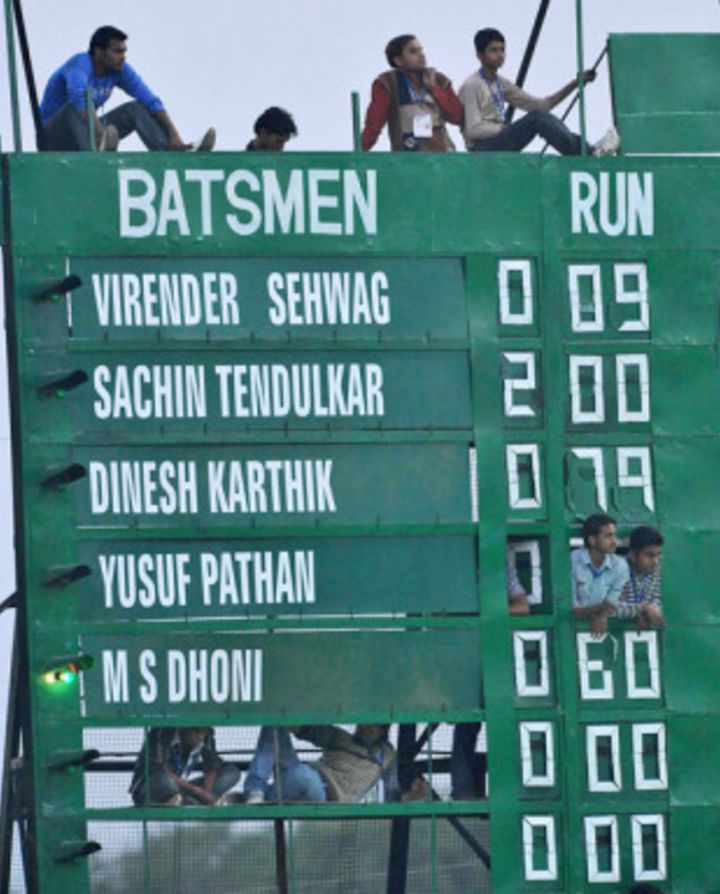Like The Don, in a league of his own
The impact a sportsperson has on the consciousness of his era, what he has meant to his country and the world, that's where the twain - Bradman and Tendulkar - meet

Cricket lovers are obsessed with records and stats - Indian fans notoriously so - which perhaps explains why the entire country went into paroxysms of delight when Sachin Tendulkar became the first batsman to score 200 runs in a 50-over match. The penny seemed to have suddenly dropped. What had been discussed for almost a half a decade in muted tones for fear of blasphemy, had acquired a brazen overtone: Move over Sir Donald Bradman, Tendulkar is now the greatest batsman of all time.
Tendulkar's spectacular run over the past two years has obviously given a fillip to this argument. I suspect that the despair arising out of the 2007 World Cup disaster has something to do with him getting a second wind and batting with the energy, ambition, competitive edge and run hunger that had defined his cricket in the first decade of his career. At 36, in his 21st year in the game, he has been playing with the enthusiasm of a 16-year-old again. I reckon he wanted to prove something to himself, and his performances of the last two years show he has done this mind-bogglingly.
I am chary of statistics leading to outrageous conclusions, but unlike Mark Twain I don't damn them. I find them fascinating and infuriating, but at all times stimulating, and have found profuse use for them in writing on cricket. Stats play a big and useful role because they provide significant tangible value to a player's worth. But they can also be quirky and deceptive, often giving misleading clues about a player's true qualitative worth.
And yet, paradoxically, Bradman's perceived greatness stems almost entirely from statistics, in particular his dazzling Test average of 99.94, which has remained unassailable for more than 60 years. Looked at every which way, it is a numbing, humbling statistic. No batsman, either before Bradman or since, has come remotely close to it. Every effort to rationalise it for contemporary evaluation has come a cropper.
So while it would be fair to say that superior fielding and better opposition would reduce Bradman's prolific run-getting to say 70-odd per innings, if you consider that batsmen today play on covered wickets with all kinds of protective gear, it would climb back into the 90s again and bring the debate back to square one. The assessment, ergo, must use other parameters.
Let's revisit the Gwalior match. Suppose Tendulkar had somehow not got the strike in the last over and remained unbeaten on 199, would he have been a lesser player? Suppose Virender Sehwag had got his third triple-century in Mumbai against Sri Lanka, would he have hurdled over Lara and become a greater batsman than Bradman? These are impossible questions to settle purely in statistical terms.
Like Bradman, Tendulkar has not merely been a cricketer but a symbol of sustained excellence, not just a role model but a metaphor for his country's aspirations, not just a sporting genius but a sociological phenomenon
A large body of work is, of course, essential to eliminate those who flicker very brightly but very briefly. But the more compelling argument according to me is to assess the impact a sportsperson has on the consciousness of his era, how he has shaped the milieu of his times, what he has meant not just to his sport but also his country and the world. That's where the twain - Bradman and Tendulkar - meet, despite the vast statistical difference that will remain when Tendulkar retires.
For, like Bradman, Tendulkar has not merely been a cricketer but a symbol of sustained excellence, not just a role model but a metaphor for his country's aspirations; not just a sporting genius but a sociological phenomenon. The pressure, the burden of expectations they have had to endure throughout their careers, finds no parallel in their sport, or their country's ethos.
It is almost impossible to compare greats from different eras. In my opinion, purely from a sporting point of view Tendulkar today stands on par with Roger Federer, Tiger Woods and Michael Schumacher. If that still doesn't resolve the issue, let me approach it differently.
If Tendulkar were to retire tomorrow, a long queue of the game's greatest batsmen would await him near the dressing room: Hammond, Hobbs, Hutton, the three Ws, Richards, Gavaskar, Dravid, Sehwag, Ponting, Lara, Chappell, Miandad, et al. And at the head of this queue would be Bradman, first to shake his hand and say, "Gosh, you little bonzer, I would have loved to play an innings like that!"
Ayaz Memon has written on cricket for over 20 years, during which time he has covered a number of tours and six World Cups. This piece also appeared in Hindustan Times
Read in App
Elevate your reading experience on ESPNcricinfo App.